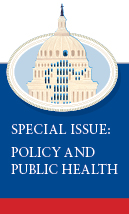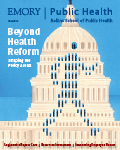Ensuring Return on Investment

Lydia Ogden 10PhD, Director of CDC's Office of Health Reform Strategy, Policy, and Coordination
Lydia Ogden informs CDC's efforts in the era of health care reform
By Lori Solomon 96C 00MPH
Just contemplating the enormity of the problems plaguing the U.S. health care system can be sobering, but tackling the transformation of the health system in an era of reform is the daily mission of Lydia Ogden 10PhD, the first graduate of Rollins' doctoral program in health services research and health policy.
|
|
Her to-do list is daunting: reining in unsustainable health care spending, ensuring affordable access to care, and maximizing population health gains in today's disjointed system. But for Ogden, the current imperfect reality is motivating.
"We're older, fatter, and sicker as a nation, and we can't afford it. Big problems that are hard to solve are not unique to public health, but I love a challenge" she says. "Nothing in our field is easy or will happen overnight. It is what you sign up for when you get into public health. I have a stepdaughter who is in her third year of medical school, and I don't want her to go out into this dysfunctional system. She's one of the reasons why I go to work each day."
Ogden is director of CDC's Office of Health Reform Strategy, Policy, and Coordination (HRSPC). The office is a central resource for disseminating information both within CDC and to state and local health departments regarding the implications of the Affordable Care Act (ACA) for public health. Ogden and her staff monitor health reform implementation at all levels and provide expert guidance on crucial features of national reform efforts. Their guidance shapes CDC's internal program strategy to achieve population health goals and helps external players with broader reform efforts, including understanding the population health implications of health benefits packages and state-level implementation of insurance exchanges and Medicaid expansion.
The U.S. Supreme Court decision to uphold ACA's individual mandate and related provisions, including guaranteed coverage and state-based exchanges, means more people can obtain insurance and access care. But the court's decision allowing states to opt out of the Medicaid expansion may negatively impact access. HRSPC measures the impact of these counterbalances.
"My office is on constant alert to monitor what states are doing and help CDC programs understand the implications for the populations they and their partners serve. But a huge part of public health is to monitor the health care system, and that is not just the health reform act," says Ogden. "Public health is the keeper of surveillance data—health insurance status, access to care, and outcomes and quality. We know the populations at risk and whom to target with preventive services or strategies. My role is to help integrate public health and what we bring to the table into the larger health system that encompasses clinical care and community-based interventions."
The wheels of health policy
|
Hollis Lin (left), Jennifer Burkholder, Emily Johnston, and Jon Altizer have gained new insight on health reform policy by working with Ogden at CDC. All are students or graduates of Rollins. |
Rollins students and alumni assist Ogden in shaping public health's changing face along the continuum of national reform efforts. Doctoral student Emily Johnston came to Rollins because of the faculty's connections and experience with implementing health policy programs. Her research interest lies in how variation in state Medicaid policy affects health status.
"There are not many fields in policy where so much is happening right now. To be in health policy and see how ACA is being implemented is fascinating and very beneficial," says Johnston, who worked in HRSPC as an Oak Ridge Institute for Science and Education Fellow. "It has opened my eyes and shown me the entire policy-making world.
"You learn in theory how policy is made and passed in the legislature," she continues. "But how the law is implemented can lead to different possibilities and different outcomes in people's health."
Working on policy implementation exposes students and graduates to the slow and sometimes discouraging pace of change in shifting national policy.
"Health care reform has such potential to positively impact the health of Americans, and to know that I had my hand in it is very satisfying both personally and professionally," says Jon Altizer 07MPH, a Deloitte contractor working in HRSPC. "In reality, the federal government has red tape. There are processes and hierarchies to observe. We are always busy and frantic, but naturally there is a certain level of frustration over not having a bigger immediate impact."
Ogden's impact on transforming America's health care system is not limited to HRSPC. Among her proudest contributions was her six-month stint in 2010 as senior health policy adviser to the bipartisan National Commission on Fiscal Responsibility and Reform, otherwise known as the Bowles Simpson Commission or the debt commission, appointed by President Obama. The commission was tasked with making recommendations to balance the federal budget by 2015. It proposed meaningful policies to improve the long-term fiscal outlook, including changes to address the growth of entitlement spending and the gap between projected revenues and federal expenditures. Ogden advised the commission regarding health-spending drivers and worked on policies to increase the value of health care dollars and curb spending while preserving access to quality care and improving health outcomes.
"Without a doubt, my time with the fiscal commission is my most lasting contribution. I am very proud of the ideas in the health arena," she says. "While not immediately ratified, many ideas and recommendations are being taken up seriously now, such as greater means testing in Medicare, increasing the Medicare eligibility age, and creating real solutions for the most vulnerable—the population dually eligible for Medicare and Medicaid. Right now, many states are acting upon the need for care coordination among the dual eligible and are moving them into managed care."
Making tough choices
Ogden is amazed by the increasing public understanding of the deficit and the mounting national discussions about it, which parallel the discussions in the class she teaches at Rollins. "Introduction to the U.S. Health Care System," a required course, exposes students to the realities of the system so they can play a role in shaping reform efforts.
"I see young people from every part of Rollins and Emory, including from law, nursing, and medicine. Most don't understand the huge financial deficit the United States is facing and what it means for them personally and professionally," explains Ogden. "We are borrowing $0.41 for every dollar spent. It is like we're having a big old party, and we're going to stick the next generation with the bill. It is imperative for every public health student to understand exactly how the U.S. health system is structured, what drives health care spending, and the value on that spend. You can't change it if you don't understand it."
Ogden's class was transformational for Ian Brantley 12MPH, who interned at HRSPC.
"I was very idealistic in thinking that health care was a universal right, regardless of the situation," recalls Brantley, who served in Nicaragua with the Peace Corps. "Nicaragua is the second poorest country in the Western Hemisphere, but it has a universal health system. But through studying with Dr. Ogden, you realize there are finite resources, and you understand that allocating these resources requires tough choices. You may want to help everybody, but there are constraints."
For students, working in HRSPC is a natural bridge between theoretical learning in the classroom and their first foray into shaping health policy.
"People who go into public health generally are idealistic," says Ogden. "They want to help and believe they are doing the Lord's work, but the problem is that we still have to be accountable and demonstrate value, especially to the American public who is funding us. That is a glaring omission in public health. We assume it's all good, but we have to demonstrate return on investment."
Jennifer Burkholder, an MSN/MPH student who interned with Ogden in HRSPC, is learning how to maintain her idealism in the health care and health policy arena.
"As an ICU nurse, I loved practicing at the bedside but saw the bigger picture of health care trends going in a scary direction with the breakdown in care coordination across disciplines," says Burkholder. "I was very idealistic out of undergraduate school, and I thought I lost that as a clinical nurse. But now I realize my beliefs are still evolving. It's easy to spot problems and gaps in the health care system, but I thought it would be easier to solve them than it is."
After she graduates next year, Burkholder intends to "maintain her nursing identity" while pursuing work in federal health reform. Nurses add "unique value and perspective both on leadership teams and in reshaping health care delivery," she says.
Students and practitioners will look to Ogden for guidance as she works to improve the value of the U.S. health system and transform the role of public health as health reform moves forward. In turn, the students she helps train will find their niche in the health policy arena.
"We're pushing a boulder uphill every day," Ogden says. "I hope to accelerate the transformation into a coherent system—and, of course, try not to have the boulder roll over my foot!"



